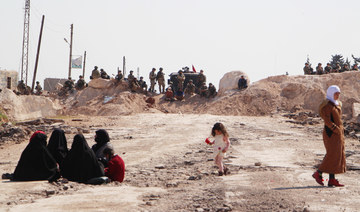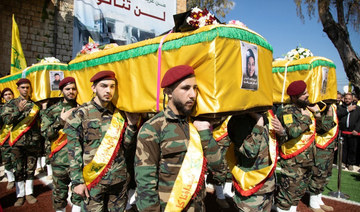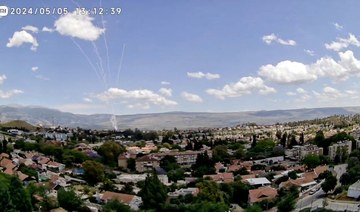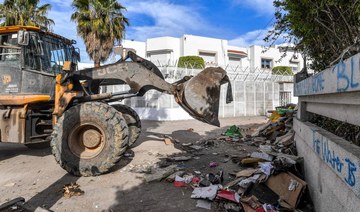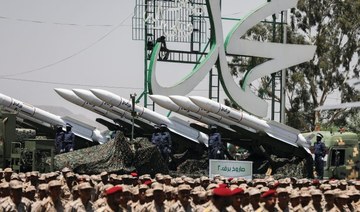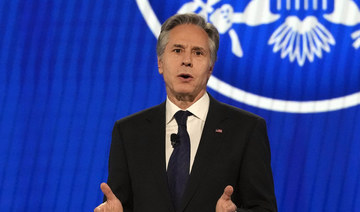ANKARA: The strategic M4 highway, which runs east-west through Idlib province, continues to be the focal point of local protests, turning the opposition-held Syrian province into a litmus paper for the success of Turkish and Russian joint moves.
This weekend, the region witnessed the first military confrontation between Turkish forces and Hayat Tahrir Al-Sham (HTS) militants.
As retaliation for Turkish forces opening fire on HTS militants on Sunday — killing four protesters participating in Al-Karama sit-in — the militant group targeted a Turkish armored vehicle with a missile in Al-Nayrab.
On Sunday morning, Turkish forces destroyed tents in Al-Karama and reportedly fired tear gas and live rounds to open the road for the passage of four Russian cars, enabling joint patrols with Russian forces on the M4 highway.
But the protesters retaliated by throwing stones at the Turkish troops.
Turkey’s drones also targeted HTS positions for the first time on Sunday, near the village of Al-Nayrab, hinting at a possible large-scale operation in the near future. The attack killed two members of the HTS and injured three others.
Emre Kursat Kaya, a researcher at the Istanbul-based EDAM think tank, said a Turkish counter-terrorism operation is looming in Idlib.
“We should look at yesterday’s events as yet another step in the escalatory trend between the Turkish forces in Idlib and the HTS. Prior to Operation Peace Shield, Turkish troops were only present in observation posts and were hardly in contact with the militants,” Kaya told Arab News.
“Since then, areas previously controlled by the HTS and others have been filled by a significant number of elite Turkish troops.”
According to Kaya, while using the excuse of “anti-Russia” protests, the HTS is attempting to inspire popular support to undermine Ankara.
“Several reports from the region suggest that the HTS is conducting a heavy disinformation campaign to portray Ankara as an occupier. The HTS is clearly trying to shift moderate rebels’ allegiance in its favor.
“Unlike other jihadi groups, the HTS has built its legitimacy on portraying itself as the primary protector of the liberated Idlib,” he said, adding that Turkey’s presence in the region and its role in stopping further regime advances is seen as a challenge by the HTS militants.
Over recent weeks, Turkey provided more training to moderate rebels in Idlib.
“Locals in Idlib lost their faith in the HTS as a protector from the regime and Russia after they saw that the group is not protecting their political and economic interests. On the other hand, they are making deals with the Assad regime. The locals did not approve of the ideology that the HTS offers to Idlib,” Bassam Barabandi, a former Syrian diplomat and co-founder of People Demand Change Inc., told Arab News.
Barabandi thinks that the US should be part of the stabilization process in Idlib by supporting Turkish efforts in dealing with Russia and giving strong guarantees to the locals that Russia will be kept away from the region.
“Such a scheme will end the presence of the HTS. The locals have concerns over the possible maneuvers of Russia. They fear that Russia may put pressure on Turkey in the future to change the deal and take more lands. The HTS takes advantage from this doubt by closing the M4,” he said.
The March 5 deal between Moscow and Ankara on reopening the M4 highway and establishing a 6-kilometer-deep security corridor in Idlib has deepened rifts among the rebel groups having their own control areas in the region. But how the HTS — the dominant group in Idlib — will be compelled into cooperation and neutralized is still the key concern.
Navvar Saban, a military expert from the Istanbul-based Omran Center for Strategic Studies, believes that there are sub-entities from the HTS among the civilians in Idlib who use protests to attack Turkish troops.
“The HTS claims that it doesn’t have any authority on these factions and that it also wants to destroy these entities,” he told Arab News.
According to Saban, these latest demonstrations were the last straw and they are the signal of a larger security operation that will be led by the Ankara-supported Liberation Front to secure the area.
“The Russians are not willing to launch an attack and don’t want to destroy their relationship with their allies. They don’t have the logistic means to launch an operation. The coronavirus pandemic risk is also keeping Russians away from any intervention,” he said.
Key Idlib highway remains focal point of protests
https://arab.news/j3npj
Key Idlib highway remains focal point of protests
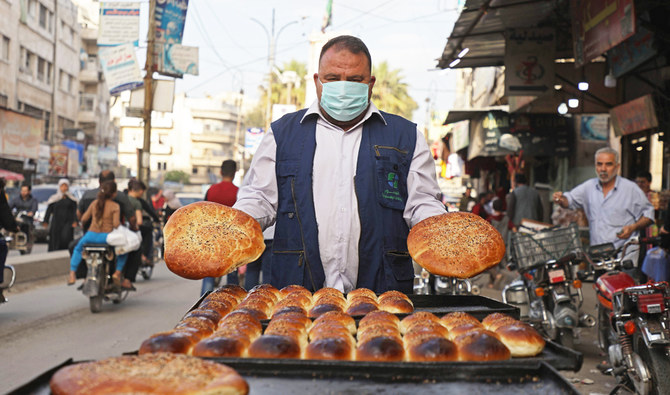
- Locals in Idlib lost their faith in the HTS as a protector from the regime and Russia after they saw that the group is not protecting their political and economic interests
80,000 Palestinians flee Rafah since Israel hiked operation this week: UN agency

RAFAH: The United Nations agency supporting Palestinian refugees said Thursday that about 80,000 people had fled Rafah in the three days since Israel intensified military operations in the south Gaza city.
“Since Israeli forces military operation intensified on 6 May, around 80,000 people have fled Rafah, seeking refuge elsewhere,” UNRWA said on X, formerly Twitter, warning that “the toll on these families is unbearable. Nowhere is safe.”
Israeli strike on Lebanon kills four Hezbollah fighters, security sources say
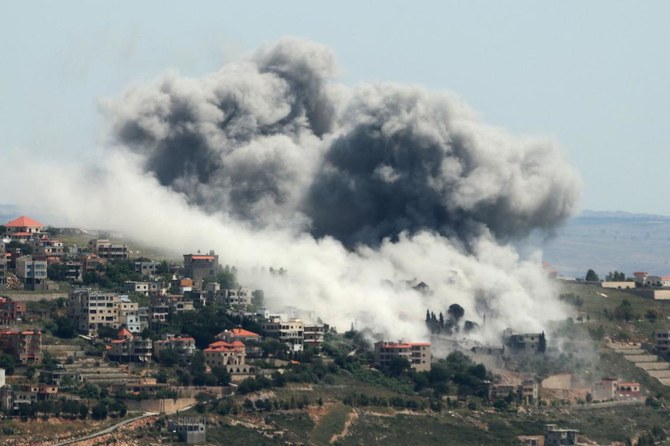
- Israeli military did not immediately comment on Thursday’s strikes
- Lebanon’s civil defense rescue force said it had pulled four bodies out of a car that had been scorched by an Israeli strike
BEIRUT: An Israeli air strike on a car in southern Lebanon killed four people on Thursday, according to Lebanon’s civil defense, with security sources saying those killed were members of armed group Hezbollah.
The conflict between Hezbollah and Israel has rumbled on since October in parallel to the Gaza war, with an escalation this week as both sides intensified their bombardment, fueling concern of a bigger war between the heavily-armed adversaries.
Israel has used artillery, drones and warplanes against targets in southern Lebanon, including to strike fighters from Hezbollah and other armed groups. Fighters in Lebanon have launched rockets and their own drones into northern Israel.
The Israeli military did not immediately reply to a request for comment on Thursday’s strikes.
Lebanon’s civil defense rescue force said it had pulled four bodies out of a car that had been scorched by an Israeli strike. Two security sources told Reuters the four killed were members of Hezbollah.
The exchanges of fire have uprooted tens of thousands of people on both sides of the border. In northern Israel, the displacement has prompted calls for firmer military action against Hezbollah.
Israeli Defense Minister Yoav Gallant warned on Wednesday that the next months “may be a hot summer,” saying either a diplomatic deal or military solution was needed to restore security.
The fighting between Israel and Hezbollah has been the most intense since they went to war in 2006.
Hezbollah has repeatedly said that it will cease fire when the Israeli offensive in Gaza stops, but that it is also ready to fight on if Israel continues to attack Lebanon.
Activist in Tunisia arrested as conditions for migrants and their advocates worsen
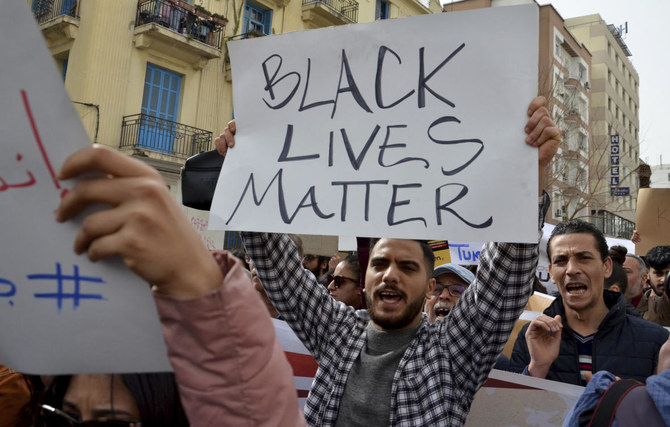
- Saadia Mosbah, who is Black, was taken into custody and her home was searched
- She was arrested after she posted on social media condemning the racism she faced
TUNIS, Tunisia: An anti-discrimination activist in Tunisia was arrested in a money laundering investigation this week as the dangerous and dire conditions facing migrants and their advocates worsen.
Saadia Mosbah, who is Black, was taken into custody and her home was searched as part of an investigation into the funding for the Mnemty association she runs.
She was arrested after she posted on social media condemning the racism she faced for her work from people accusing her of helping sub-Saharan African migrants, said Bassem Trifi, the president of the Tunisian League for the Defense of Human Rights.
Her arrest was the latest reflection of the problems facing migrants in Tunisia as authorities bolster efforts to police the shoreline where many embark on boats hoping to reach Europe.
In a national security council meeting focused on irregular migration, Tunisian President Kais Saied said Tuesday that associations that receive substantial foreign funds were “traitors and agents” and shouldn’t supplant the state’s role in managing migration and fighting human trafficking.
Fewer migrants have made the dangerous journey across the Mediterranean Sea this year due to weather and beefed-up border security. But human rights groups caution that efforts to curb crossings haven’t protected the tens of thousands of migrants stuck in Tunisia.
More than 80 migrants were arrested in Tunis last week after clashes with law enforcement as they cleared encampments in the capital that were “disturbing the peace,” according to Tunisia’s Radio Mosaique.
Hundreds of migrants had camped near the headquarters of the UN refugee agency and International Organization for Migration, often demanding the agencies repatriate them outside of Tunisia. Law enforcement used heavy machinery to raze their tents and then bused them outside of the city to “an unknown destination,” said Romdhane Ben Amor, a spokesman for the Tunisian Forum for Economic and Social Rights.
“Tunisia is deepening the crisis and promoting the idea that there is no solution,” Ben Amor told Radio Mosaique.
An estimated 244 migrants — most of them from outside Tunisia — have died or disappeared along the country’s Mediterranean coastline this year, including 24 whose bodies were found last week, the NGO said.
In a report based on government data released Monday, it noted that the number of migrants without papers boating across the Mediterranean had decreased as Tunisian authorities report an increasing number of interceptions. Such is the case for both migrants from Tunisia and migrants passing through the country en route to Europe.
In April, authorities directly thwarted 209 migration attempts and in total prevented more than 8,200 migrants from reaching Italy, the majority from sub-Saharan African countries. Tunisian Coast Guard have prevented more than 21,000 migrants from reaching Italy this year.
Managing migration to prevent scenes of chaos and despair along Italian shorelines has been a top priority for European leaders, including Italian Premier Giorgia Meloni, who has visited Tunis four times this year.
North African and European officials have sought to curb human trafficking and better police borders and coastlines to prevent deaths at sea. However, thousands of migrants fleeing conflict, poverty, persecution or hoping for a better life have continued to make the journey. They take boats from the coast north of Sfax, Tunisia’s second-largest city, to Italian islands such as Lampedusa, about 130 kilometers (81 miles) away.
The European Union hopes to limit migration with policies including development assistance, voluntary return and repatriation for migrants and forging closer ties with neighboring governments that police their borders. They have pledged billions of dollars over the past year to countries including Tunisia, Mauritania and Egypt to provide general government aid, migrant services and border patrols.
Though European leaders have hailed a $1.1 billion agreement with Tunisia as a template, Saied has pledged not to allow the country to become a “border guard” for Europe.
Less than one-third as many migrants have reached Italy in 2024 as had at this point last year, according to May 8 figures from Italy’s Interior Ministry. The UN refugee agency reported that more than 24,000 migrants traveled from Tunisia to Italy in the first four months of 2023 while less than 8,000 had successfully made the journey over the same time period this year.
Yemen’s Houthis say they targeted ships in Gulf of Aden, Indian Ocean
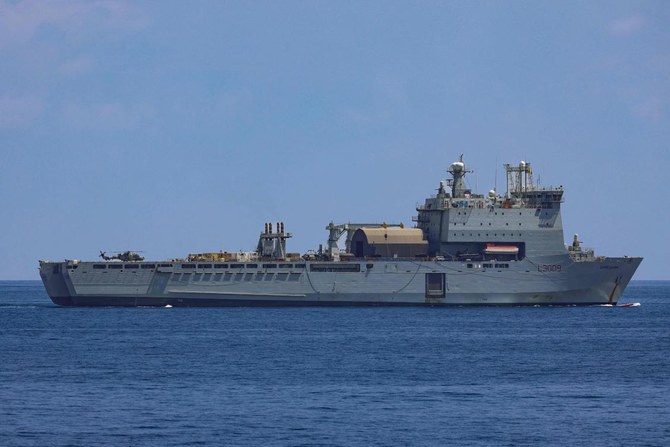
- The group also targeted the MSC VITTORIA in the Indian Ocean and again in the Gulf of Aden
DUBAI: Yemen’s Houthis on Thursday claimed two missile attacks in the Gulf of Aden on two Panama-flagged container ships that caused no damage, while also saying they targeted a ship in the Indian Ocean in a previously unreported assault.
The claims by Brig. Gen. Yahya Saree come as the tempo of the militia attacks have waned in recent weeks as they’ve been targeted by repeated airstrikes launched by a US-led coalition warship in waterways crucial to international trade. The Houthis insist their assaults will continue as long as Israel’s war on Hamas in the Gaza Strip goes on.
Saree in a prerecorded statement claimed attacks on the MSC Diego and MSC Gina. The Joint Maritime Information Center, a US-led coalition of nations operating in the Mideast, said those two missile attacks happened early Tuesday.
“Neither were hit and all crew on board are safe,” the center said. “The vessels were last reported proceeding to next port of call.”
The center added that the vessels were “likely targeted due to perceived Israeli affiliation.”
Both vessels were operating for Geneva-based Mediterranean Shipping Co., which did not immediately respond to a request for comment.
Saree did not say why it took the militia two day to claim the attacks. He also claimed the Houthis targeted the MSC Vittoria, another container ship, in the Indian Ocean. An attack on that vessel, however, has not been acknowledged by any authorities.
The Houthis say their attacks on shipping in the Red Sea and Gulf of Aden are aimed at pressuring Israel to end its war against Hamas in Gaza, which has killed more than 34,000 Palestinians there. The war began after Hamas-led militants attacked Israel on Oct. 7, killing 1,200 people and taking some 250 others hostage.
The Houthis have launched more than 50 attacks on shipping, seized one vessel and sunk another since November, according to the US Maritime Administration. Shipping through the Red Sea and Gulf of Aden has declined because of the threat.
Monitor, Iraqi group say Israel hits facilities in Syria
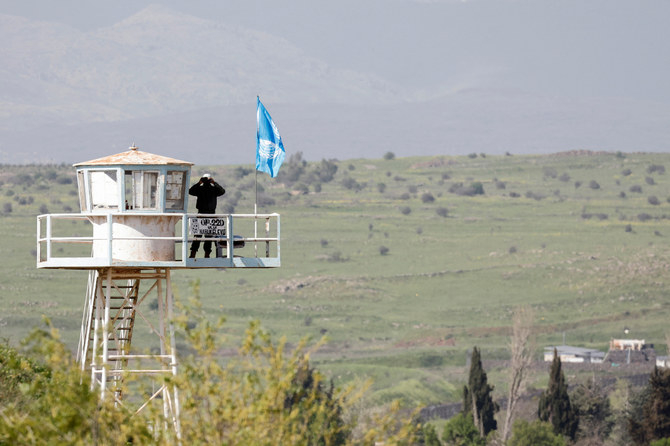
- The Syrian Observatory for Human Rights said “Israeli air strikes targeted a cultural center” and a “training facility” of the Iraqi Al-Nujaba movement
- Three members of the Iraqi group were wounded
BEIRUT: Israeli strikes on Syria early Thursday targeted facilities belonging to Iraq’s Al-Nujaba armed movement, a war monitor and the pro-Iran group said, with Damascus saying an unidentified building was attacked.
Israel has carried out hundreds of strikes in Syria since the outbreak of the civil war in its northern neighbor in 2011, mainly against army positions and Iran-backed fighters.
But the strikes increased after Israel’s war with Hamas in the Gaza Strip began on October 7, when the Iran-backed Palestinian militant group launched an unprecedented assault on Israel.
The Syrian Observatory for Human Rights said “Israeli air strikes targeted a cultural center” and a “training facility” of the Iraqi Al-Nujaba movement in the Sayyida Zeinab area south of Damascus.
Three members of the group were wounded according to the Britain-based Observatory, which relies on a network of sources inside Syria.
A source within the Iraqi faction, requesting anonymity as they were not authorized to speak to the media, confirmed that a “cultural center” belonging to the group was destroyed in the “Israeli” attack, but reported no casualties.
Al-Nujaba does “not have a declared military base in Syria,” the source added.
Syria’s defense ministry said that “at around 3:20 am today, the Israeli enemy launched an air attack from the direction of the occupied Syria Golan Heights targeting a building in the Damascus countryside.”
The attack caused “some material damage,” said the statement carried by state media, adding that air defense systems shot down some of the missiles.
The Sayyida Zeinab area is home to an important Shiite Muslim shrine that is protected by pro-Iran groups, including Lebanon’s Hezbollah, alongside the Syrian army, according to the Observatory.
The Al-Nujaba movement is part of a pro-Iran alliance in Iraq that Washington has blamed for numerous attacks on its forces.
Israel rarely comments on individual strikes on Syria, but has repeatedly said it will not allow its arch-enemy Iran to expand its presence there.
An April 1 raid blamed on Israel levelled Tehran’s consulate in Damascus and killed seven Iranian Revolutionary Guards, two of them generals.
That strike prompted Iran to launch a first-ever direct missile and drone attack against Israel on April 13-14 that sent regional tensions spiralling.




